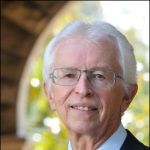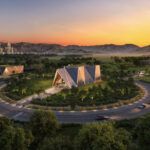Time to insert the control rods on North Korea
By Siegfried S. Hecker | October 17, 2017
With reciprocal threats of annihilation, US President Donald Trump and North Korean leader Kim Jong-un appear to have brought us to the brink of war. The underlying problem is North Korea’s relentless drive to build a nuclear arsenal that can threaten the United States. The immediate crisis, though, is driven by Trump’s response. To contain the crisis—and prevent the escalating war of words from turning into a nuclear war—we need the political equivalent of control rods, which get inserted into a nuclear reactor core to prevent a runaway catastrophic reaction.
Control rods contain elements that absorb the neutrons generated by the fission of uranium and plutonium. Judiciously inserted by nuclear reactor operators, the rods help maintain a fission rate high enough to generate heat for producing electricity, but not so high as to cause a runaway fission chain reaction that results in a meltdown of the reactor fuel. Control rods also serve as safety features, available to help quickly shut down operations should things go wrong.
Today, the Trump administration’s undisciplined response to North Korea requires some political control rods to avoid a meltdown resulting in war. In the United States, our best hopes are Secretary of State Rex Tillerson and Defense Secretary James Mattis. Potential control rods also exist in North Korea, and Washington should listen to and try to understand these voices, rather than demonize or blacklist them.
Trump spent the late summer upping the rhetorical ante against North Korea with threats that it would experience “fire and fury” and “total destruction,” and a claim that Kim Jong-un and Foreign Minister Ri Yong-ho “won’t be around much longer.” Tillerson acted as a political control rod when he told the press on September 30th that the United States had multiple diplomatic channels open with North Korea.
Trump responded on Twitter, “Save your energy Rex, we’ll do what has to be done.” But Mattis also acted as a control rod when he subsequently told Congress he fully supports Tillerson’s effort to achieve a diplomatic solution on North Korea. At the US Army Annual Meeting on October 9th, Mattis said the army must “be ready to ensure that we have military options” available, but underscored the importance of diplomacy by saying, “it is right now a diplomatically led, economic sanctions-buttressed effort to try to turn North Korea off this path.” It is difficult to assess who in Washington will have the final say, but at this point we can thank Tillerson and Mattis for turning down the heat.
On September 18th, Trump delivered a speech to the UN General Assembly in which he lambasted and threatened North Korea. Kim Jong-un’s response was, predictably, equally threatening. He retorted, “I will surely and definitely tame the mentally deranged US dotard with fire.” Fortunately, there may be those who can play the role of control rods on the North Korean side as well. When Foreign Minister Ri Yong-ho made his own speech at the UN General Assembly, he not surprisingly countered Trump’s fiery rhetoric with some of his own. But he also made more measured statements, for instance saying that “the DPRK has entered a phase of completing the state nuclear force in accordance with its line of simultaneous development of the economy and the nuclear force.” He went on, “Our national nuclear force is, to all intents and purposes, a war deterrent for putting an end to nuclear threat of the US and for preventing its military invasion; and our ultimate goal is to establish the balance of power with the US.”
Ri Yong-ho’s remarks do not suggest a wish for war, but rather an attempt to achieve a level of security that will allow his country to pivot toward economic development. Ri could, in fact, be one of the key control rods inside North Korea.
I met him in Pyongyang during my seventh and last visit to North Korea in November 2010, when my Stanford University colleagues and I were shown a modern uranium centrifuge facility. He was unapologetic about the country’s nuclear weapons program. In our wide-ranging discussions, he told us that North Korea’s nuclear weapons will be around as long as Washington continues to be hostile to Pyongyang. He complained that the US administration doesn’t think of North Korea as a country; it just thinks of it as an enemy to collapse or change. He said, “When the United States sees us this way, how can we see them as a normal dialogue partner? This matters.”
Ri Yong-ho said that Pyongyang was ready for dialogue, though not for the sake of dialogue itself but rather to achieve results. He did not see the political will on America’s part. He told us that if the United States was truly concerned about nuclear proliferation, it should think about finding the root cause and treating it. In the case of North Korea, he said, the root cause was deep mistrust.
Ri Yong-ho has had plenty of exposure to the outside world. He served as North Korea’s ambassador to Great Britain from 2003 to 2007. He understands diplomacy. I was impressed with his remarkable understanding of US domestic politics and global nonproliferation issues. He praised President Barack Obama’s 2009 Prague speech in which he called for a world without nuclear weapons, and criticized President George W. Bush for formulating his mindset on North Korea based on a single North Korean defector’s book.
I asked Ri Yong-ho what he would do if he could write the script, and he said, “we are prepared to talk with the United States. If we can sit down, one thing we can talk about as a point of departure is nuclear proliferation—horizontal and vertical.”
While Ri Yong-ho demonstrated a deep loyalty to his country, he also showed rationality, levelheadedness and a commitment to a diplomatic solution. That was eight years ago, but I believe the opportunity is still there today. To seize it, the United States must engage officials like Ri Yong-ho to better understand North Korea.
The other North Korean voice of reason and sanity may be another Ri, Ri Hong-sop, who was director of the Yongbyon Nuclear Complex and my host when I first visited the site in January 2004. In September, the Korea Central News Agency released photos showing Ri Hong-sop explaining what it said was a two-stage thermonuclear bomb to Kim Jong-un. Ri Hong-sop is now a national hero, but sanctioned by the United States and on its blacklist of people barred from contact. I met with him during four of my visits to North Korea. I found him to be very competent, intensely loyal and proud of his country’s nuclear accomplishments. I also found him to be genuinely concerned about how he and his nuclear colleagues could better the lives of the North’s citizens.
In 2008, when North Korea had temporarily halted its plutonium production program, I asked Ri Hong-sop what he hoped to do with the nuclear complex now that the Yongbyon nuclear facilities were being disabled. He made a very convincing pitch for the need to provide nuclear electricity to his energy-starved country, and the need for medical isotopes to diagnose and treat serious health problems.
We had substantive discussions about nuclear safety and touched on the security of North Korean nuclear assets. I did not see Ri Hong-sop during my last two visits to North Korea; he was apparently moved to head the Nuclear Weapons Institute. When I asked about him during my last visit in November 2010, my host told me somewhat sarcastically that my government wouldn’t let me meet Ri Hong-sop because the latest US sanctions had put him on a blacklist. So much for the benefits of sanctions: They did not slow North Korea’s progress on its nuclear program, but did eliminate one of the few windows we had into it. As much as the United States is troubled by North Korea’s nuclear weapons program, I take at least some level of reassurance from the fact that someone as serious and responsible as Ri Hong-sop is at the head of it.
Much has changed for the worse since 2010. That year, Pyongyang had a handful of primitive nuclear bombs with no missiles able to deliver them. After nearly nine years without serious dialogue between Washington and Pyongyang, North Korea has amassed a threatening nuclear arsenal, possibly consisting of 25 to 30 nuclear weapons that can be mounted on missiles capable of reaching all of South Korea and Japan. They may soon be able to reach the US mainland, and based on the success of North Korea’s September 3rd nuclear test, the missiles may be tipped with hydrogen bombs in a few years. With threats rather than talks, the political nuclear situation is now closer than ever to a runaway reaction.
It is time for Washington to talk to Pyongyang to lower tensions and avoid war. The Trump administration should dispatch a small team to meet with Kim Jong-un. The two sides should establish ways to avoid the misunderstandings and miscalculations that could quickly send us over the cliff into nuclear war. Such talks should not be seen as a reward or concession to Pyongyang, nor construed as signaling acceptance of a nuclear-armed North Korea. They could, however, deliver the message that while Washington fully intends to defend itself and its allies from any attack with a devastating retaliatory response, it does not otherwise intend to attack North Korea or pursue regime change.
What makes such talks possible is that we have some rational people on both sides, control rods who can take the necessary steps to re-establish critical lines of communication to avoid a catastrophe. Tillerson, Mattis, Ri, and Ri may be among them, and there may be others. People like these can slow the dangerous rise in temperature.
Together, we make the world safer.
The Bulletin elevates expert voices above the noise. But as an independent nonprofit organization, our operations depend on the support of readers like you. Help us continue to deliver quality journalism that holds leaders accountable. Your support of our work at any level is important. In return, we promise our coverage will be understandable, influential, vigilant, solution-oriented, and fair-minded. Together we can make a difference.
Topics: Columnists, Nuclear Weapons














